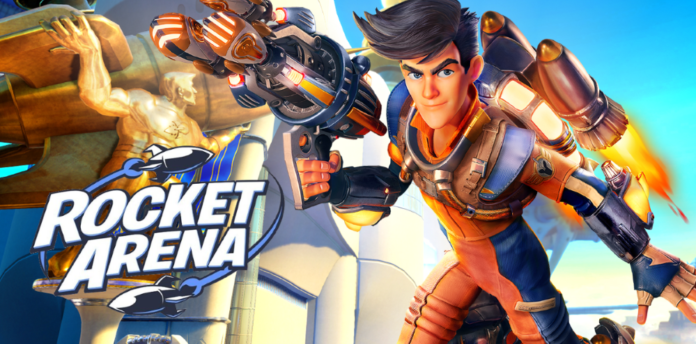The Secret to Successful Online Shooters: Finding the Perfect Tone
In a crowded marketplace, it's the games that marry their design with a unique overall voice, like Nexon's Rocket Arena, that find the greatest success.

In a crowded marketplace, it's the games that marry their design with a unique overall voice that find the greatest success.
Multiplayer shooters, one of the most popular genres in gaming and most watched on Twitch, has long taken much of its visual language from modern military culture and iconography, and understandably so. It could be argued that the modern era of multiplayer gaming began with Call of Duty 4: Modern Warfare, way back in 2007, and ever since, in addition to it and Battlefield’s annualized releases, there’s never been a shortage of new, exciting competition in the space, whether it be the highly tactical action of CS:GO and Rainbow Six, the vehicular mayhem of World of Tanks, or an untold number of smaller games with dedicated communities like the recent World War 3.
But, this presents an issue. As the genre continues to be a dominant force in the world of streaming, it makes sense for new developers and publishers to continue pushing the space forward with titles of their own, to try and capture the attention of this enormous audience and become the next big thing. And that makes a lot of sense. As we continue to see the same military tropes, however, the same jargon, the same mood in game after game, year after year, it all starts to blend together, at least from the outside.
That’s not to say that these titles stop being popular: far from it. Every new rumor and detail about the next Call of Duty is still reported as major news. But, taking a step back and looking at the space of competitive shooters, what games have risen to the top in recent years? What do some of the bigger success stories - Overwatch, Apex Legends, the mighty Fortnite - have in common? There are, of course, a few answers, but one on which I would like to focus today: they all have a unique tone.
And I mean this from top to bottom. Each of the games above relies on a a visual style that is completely their own. Each features unique and evocative sound design, from music to voice to effect work. Each even builds upon different styles and speeds of gameplay. All of this combines to accentuates the choices made in terms of game design and give each game its own particular feel, and one that’s far removed from the tactical, hyper-realistic and serious worlds of the modern military and warfare.
That final point is important; each decision made in designing the game's world builds upon the actual game design. It’s absolutely possible for these two elements to be in conflict with one another, an experience often called ‘ludonarrative dissonance.” It’s the developers who allow the two to work together, who recognizes what mood best suits their gameplay experience, and then lets them feed into each other, that has the best chance to make something that truly stands out from the crowd.
Take, for example, the forthcoming team-based shooter Rocket Arena.
There are a few stand-out elements that make this game, currently in beta, unique, in terms of gameplay. For one, characters don’t die, and there’s no blood, headshots, or dismemberment, with damage instead making characters increasingly vulnerable to being “knocked out.” The second element is its focus on fast, vertical movement using double, triple, and rocket jumps to traverse the play area, which makes gameplay chaotic and often silly. The team at Final Strike Games understood that all of this makes for an experience that is less serious, more slapstick and frenetic, and every element of design leans into it. The colors are rich and bright. The maps are filled with ridiculous billboard advertisements and graffiti. The characters are arch, and cartoonish, and can stand over fallen opponents and taunt them with poses called “Pwns.” Everything is built to make sure the player is focused on fun, on the chaos and not the consequences, and it works.
The result is a title that stands out from the crowd. It's family friendly, so it can be enjoyed by a more wide range of players of many different ages. What's more, the less serious tone makes it more inviting to players of different skill levels. In a space dominated by military shooters wherein hyper-skilled competitors are myriad and combat is an intense, serious, often meticulous affair, Rocket Arena stands out as being overwhelmingly, intentionally different.
So many developers out there are trying to build something special in the multiplayer shooter space, which is exciting. We keep seeing new twists in terms of gameplay, new sub-genres and communities, and it pushes the artform forward. But, when you’re trying to break into such a crowded ecosystem, it’s important to remember that it’s just as important to identify what tone best suits the things that makes your game different, and how you can let it and the game design work together to create something that players will really notice. If you don't stand out from the crowd, it's easy to get lost, so don't hold back on your game's sense of personality. It will make all the difference.
Be sure to check out what's rising and falling in the world of streaming in our weekly #Top5OnTwitch, and follow us on Twitter and LinkedIn for all the latest blogs, announcements, and game marketing news from the team at GAMESIGHT!

